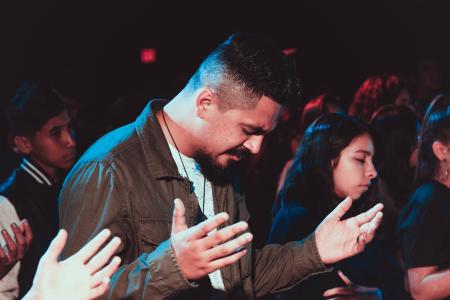The prayer of Jesus in the garden of Gethsemane is powerful for us today. It’s easy to miss the simple power contained within this prayer because we are accustomed to reading it as part of the crucifixion story. Jesus prayed, “Father, if You are willing, take this cup away from Me—nevertheless, not My will, but Yours, be done.” (Luke 22:42). It is the second half of the prayer on which I’d like to focus: “not my will, but yours be done.”

A couple of years earlier, Jesus had taught His disciples to pray in a similar manner, when He prayed, “Your will be done on earth as it is in heaven.” (Matthew 6:10). Jesus prayed and instructed us to pray for God’s will to be done, regardless of what we face or what is swirling around us.
We face so many choices in life, too many difficult decisions each day to count. In each case, we can pray, “Not my will, but yours be done.” This is a hard prayer. It won’t feel natural at first. We’re accustomed to trying to figure out the path of least resistance and the option which will bring us the least pain and the most joy. In His humanity, Jesus felt the same. It’s why before He prayed, “Not my will, but Yours”, He had asked the Father, “If You are willing, take this cup away from Me…” (Luke 22:42). In His flesh, He didn’t want to endure what He faced. None of us would. Jesus knows what it is to experience fear, dread, and anxiety. He knows to the point of sweating blood (Luke 22:44).
The beauty of this prayer lies in the word connecting “If You are willing, take this cup away from Me” and “not My will, but Yours, be done.” The word is “nevertheless”. Despite how much anxiety He was feeling, despite the gruesome torture and death He knew was before Him, Jesus said, “nevertheless, I will choose to do Your will, not mine.” He needed all the power of God to be able to say “nevertheless.” Like us, His human side would have preferred to stick with, “let this cup pass from me.” But His devotion to God allowed Him to say, “nevertheless – not my will, but Yours.”
We have the same power inside us. In the midst of any struggle or difficulty we face, Jesus empowers us to move from our prayers for deliverance to be able to say, “Nevertheless, not my will, but yours.” We are not destined to stay stuck in our fear or anxiety. We are not fated to paralysis and dread. We have been given the power to say, “nevertheless”. There is freedom in saying, “not my will, but Yours.” It releases us from trying to figure things out on our own. It informs us we will not be going through whatever comes next alone. Whatever you are facing, no matter how it feels, after you have prayed for deliverance, add the surrendering word, “nevertheless.” Then finish with the powerful flourish of, “Not my will, but Yours be done.”